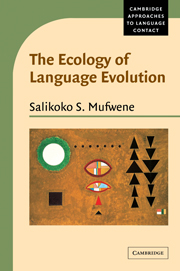Book contents
- Frontmatter
- Contents
- List of illustrations
- Preface
- Acknowledgments
- 1 Introduction
- 2 The Founder Principle in the development of creoles
- 3 The development of American Englishes: factoring contact in and the social bias out
- 4 The legitimate and illegitimate offspring of English
- 5 What research on the development of creoles can contribute to genetic linguistics
- 6 Language contact, evolution, and death: how ecology rolls the dice
- 7 Past and recent population movements in Africa: their impact on its linguistic landscape
- 8 Conclusions: the big picture
- Notes
- References
- Author index
- Subject index
6 - Language contact, evolution, and death: how ecology rolls the dice
Published online by Cambridge University Press: 18 December 2009
- Frontmatter
- Contents
- List of illustrations
- Preface
- Acknowledgments
- 1 Introduction
- 2 The Founder Principle in the development of creoles
- 3 The development of American Englishes: factoring contact in and the social bias out
- 4 The legitimate and illegitimate offspring of English
- 5 What research on the development of creoles can contribute to genetic linguistics
- 6 Language contact, evolution, and death: how ecology rolls the dice
- 7 Past and recent population movements in Africa: their impact on its linguistic landscape
- 8 Conclusions: the big picture
- Notes
- References
- Author index
- Subject index
Summary
In this chapter, I elaborate the population genetics perspective introduced in chapter 1 and adopted in the subsequent chapters. I submit more justification here for the position that there are indeed heuristic advantages in approaching language evolution on the model of population genetics, assuming that a language is a species but not an organism. However, I also argue that the linguistic species need not be a clone of any biological species, despite the fact that it shares several properties with the parasitic species. In fact, the proposed population genetics of language evolution is more than an analog of population genetics, although its heuristics has been very much inspired by the latter.
A linguistic species must be defined on its own independent terms and its evolutionary properties hypothesized according to its own combination of ontological characteristics. These account for both the similarities and differences which it displays with its closest kin in biological evolution. The basic assumption is that there are general evolutionary principles which apply similarly to the linguistic and biological species. However, there are species-specific principles which distinguish them from each other, based in part on whether a species is of the Darwinian or Lamarckian kind, on whether traits are transmitted sexually or asexually, horizontally and/or vertically, on whether the default quality of copying in trait inheritance is with or without modification, etc. One cluster of factors that plays an important role in any theory of evolution is “ecology.”
- Type
- Chapter
- Information
- The Ecology of Language Evolution , pp. 145 - 166Publisher: Cambridge University PressPrint publication year: 2001

